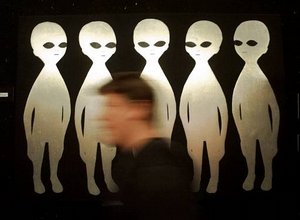Molecular Fingerprint of Animal Kingdom (Technion - Israel Institute of Technology)
Edit Public Technologies 21 Feb 2016
(Source. Technion - Israel Institute of Technology). New 'molecular fingerprint' of animal kingdom emerges from gene regulation survey ... Professor Itai Yanai X ... Tamar Hashimshony in the Yanai lab ... Prof ... a fish, a worm, a fly, a water bear, a sponge, and five others, each of a different phylum (a term coined by German naturalist Ernst Haeckel in the 19thcentury to describe a group of animals with the same body plan) ... Yanai ... Original Document....
East Asia Makes A Comeback In The Human Evolution Stakes
Edit IFL Science 05 Feb 2016
Dubois was a young medically trained Dutch anatomist fascinated by 19th Century ideas about evolution, especially those developed by the highly influential German biologist Ernst Haeckel; Darwin’s continental intellectual rival. The first evolutionary tree of life produced by Ernst Haeckel in the 19th Century ... Haeckel discovered and described ......
G. Stanley Hall Biography
Edit About.com 30 Jan 2016
G. Stanley Hall was a psychologist perhaps best-known as the first American to earn a Ph.D ... in Psychology.Birth and Death.. G ... He was heavily influenced by Ernst Haeckel's recapitulation theory, which suggested that embryonic stages of an organism resemble the stages of development of the organism's evolutionary ancestors, a theory that is today rejected by most evolutionary scientists ... Blair-Broeker, C.T., Ernst, R., Ernst, R.M ... ....
East Asia makes a comeback in the human evolution stakes (UNSW - The University of ...
Edit Public Technologies 27 Jan 2016
Dubois was a young medically trained Dutch anatomist fascinated by 19th Century ideas about evolution, especially those developed by the highly influential German biologist Ernst Haeckel; Darwin's continental intellectual rival. Haeckel discovered and described hundreds of species, but was also the first biologist to draw an evolutionary tree or ......
Atheists becoming disillusioned with the new atheism
Edit The Examiner 20 Jan 2016
It’s a tired story by now ... Atheism was no longer a quietly held bemusement at those who still chose to cling to their outdated myths ... In his article, “What Scares the New Atheists,” Atheist John Gray points out that Atheism in and of itself has no inherent values, and that in the past, atheism has dogmatically championed such causes as the racial superiority of Ernst Haeckel and the eugenics of Julian Huxley. Says Gray, ... ....
The Woman Who Made Science Beautiful
Edit The Atlantic 19 Jan 2016
Metamorphosis insectorum Surinamensium. It was silkworms that first captured thirteen–year–old Maria Sibylla Merian’s attention ... It was unlike any other book yet written ... ... The drawings were exquisite ... and the nature of their diet.’ Almost two centuries before the German zoologist Ernst Haeckel coined the term ‘Oecologie’—ecology—Merian published plates that depicted ecological communities ... ....
Roxanne Sexauer’s “Taproot” exhibition to showcase woodcut prints (La Sierra University)
Edit Public Technologies 23 Dec 2015
(Source. La Sierra University). On Sun., Jan. 10, Sexauer will display her work in a show titled 'Taproot' at La Sierra University's Brandstater Gallery. The exhibit will open with an artist's reception from 6-8 p.m. on Jan. 10 ... Influences of her work include earlier prints that depict aspects of animal and plant kingdoms, particularly woodcuts by Conrad Gessner and Ernst Haeckel, as well as early graphics of microscopic animals ... - 4 p.m....
What Kind of Leaders Are Needed for Our Rapidly Changing World?
Edit Huffington Post 21 Dec 2015
Perhaps the greatest characteristic of our times is the speed of change. The world we knew growing up is vastly different to the world we face today ... If we take away one thing from the development of our brains, and we should, given that ontogeny and phylogeny recapitulate each other, an observation initially made by 19th century German biologist and philosopher Ernst Haeckel, we would realise that connections thrive on compassion ... ....
Scientists have a long history of trying to convince themselves that race is genetic
Edit Quartz 26 Nov 2015
Others who’ve been guilty include biologists like Ernst Haeckel and historians such as Henri de Boulainvilliers ... ....
How Science has Been Abused to Promote Racism
Edit Huffington Post 23 Nov 2015
Tim Crowe, University of Cape Town. Race in human taxonomy - the science of classifying organisms - has a long, disgraceful history. Individuals have used race to divide and denigrate certain people while promoting their claims of superiority. Some of these individuals were, and are, respected in their time and their fields ... Others who've been guilty include biologists like Ernst Haeckel and historians such as Henri de Boulainvilliers ... ....
Honours artists explore the world through painting and photography (Southern Cross University)
Edit Public Technologies 12 Nov 2015
(Source. Southern Cross University) ... Honours is also the pathway to postgraduate studies. The artists and their artists' statements.. David Carroll, painter ... Giovanna Field, painter ... 'My work, The Plastic Ocean Project, developed out of a fascination for the illustrations of Ernst Haeckel. Like Haeckel, I've devoted my creative activity to the investigation and conservation of the multifarious lifeforms that are found in our oceans ... Photo....
The Origins of Economic Thought
Edit Huffington Post 11 Nov 2015
I wonder, what are the structural issues that lead us to re-enact unhelpful patterns of the past? What is the underlying blind spot that, if illuminated, could help us to see the hidden structures below the waterline? ... The problem is us ... Dr Scharmer goes on to explain that the word 'ecology' was coined in 1866 by the German biologist Ernst Haeckel to mean the study of a living organism and its surroundings ... ....
NSF awards $12.3 million for research on evolutionary history (NSF - National Science Foundation)
Edit Public Technologies 15 Sep 2015
(Source. NSF - National Science Foundation). Press Release 15-110. NSF awards $12.3 million for research on evolutionary history. Genealogy of Life (GoLife) awards offer new window into evolution of species, foster synthesis of biodiversity data September 15, 2015 ... It has also uncovered how much more we have to learn ... 2015 NSF Genealogy of Life (GoLife) Awards. ... -NSF- ... The tree of life as viewed by scientist Ernst Haeckel in the late 1800s....
- 1
- 2
- 3
- 4
- 5
- Next page »









